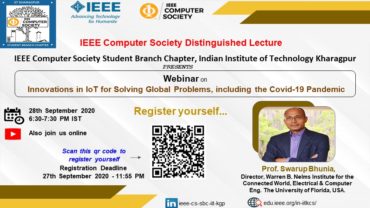Innovations in IoT for Solving Global Problems, including the Covid-19 Pandemic [Sept. 28]
Speaker : Prof. Swarup Bhunia, Director, Warren B. Nelms Institute for the Connected World, Steven Yatauro endowed faculty fellow at the Department of Electrical and Computer Engineering at University of Florida, USA.
Date : September 28, 2020, 6:30 PM to 7:30 PM (IST) / 9:00 AM to 10 AM (EST)
Register here https://lnkd.in/gu-Z3Xy by September 27, 2020, 11:55 PM
Abstract :
Internet of things (IoT) is a system framework comprising of several layers such as device layer, fog layer, cloud layer, and each layer performs a specific task. Multi-layer IoT system architecture integrates devices in an efficient way to support data communication, storage, and processing. By 2020, it is estimated that the total number of Internet-connected devices being used will be amounting to 50 billion. As these numbers grow and technologies become more mature, the IoT generates big data with a variety of multiple modalities and varying data quality. The fog layer is the intermediate layer, which aggregates the data from multiple IoT nodes within an area foot-print. The fog also has processing and storage capabilities, which enable them to process and analyse the data considering a set of IoT nodes and for a given period of time. In order to perform analytics comprising a large number of IoT nodes i.e. multiple fog footprints and over a long period of time both data storage and processing are done at the cloud end. Intelligent processing and analysis of this big data at the Fog end is the key to developing smart IoT applications. This lecture emphasises upon the various machine-learning methods that deal with the challenges presented by IoT data and its efficient implementation in the IoT-Fog Computing framework by considering some of the emerging domains of IoT applications such as health, environment, agriculture etc.



